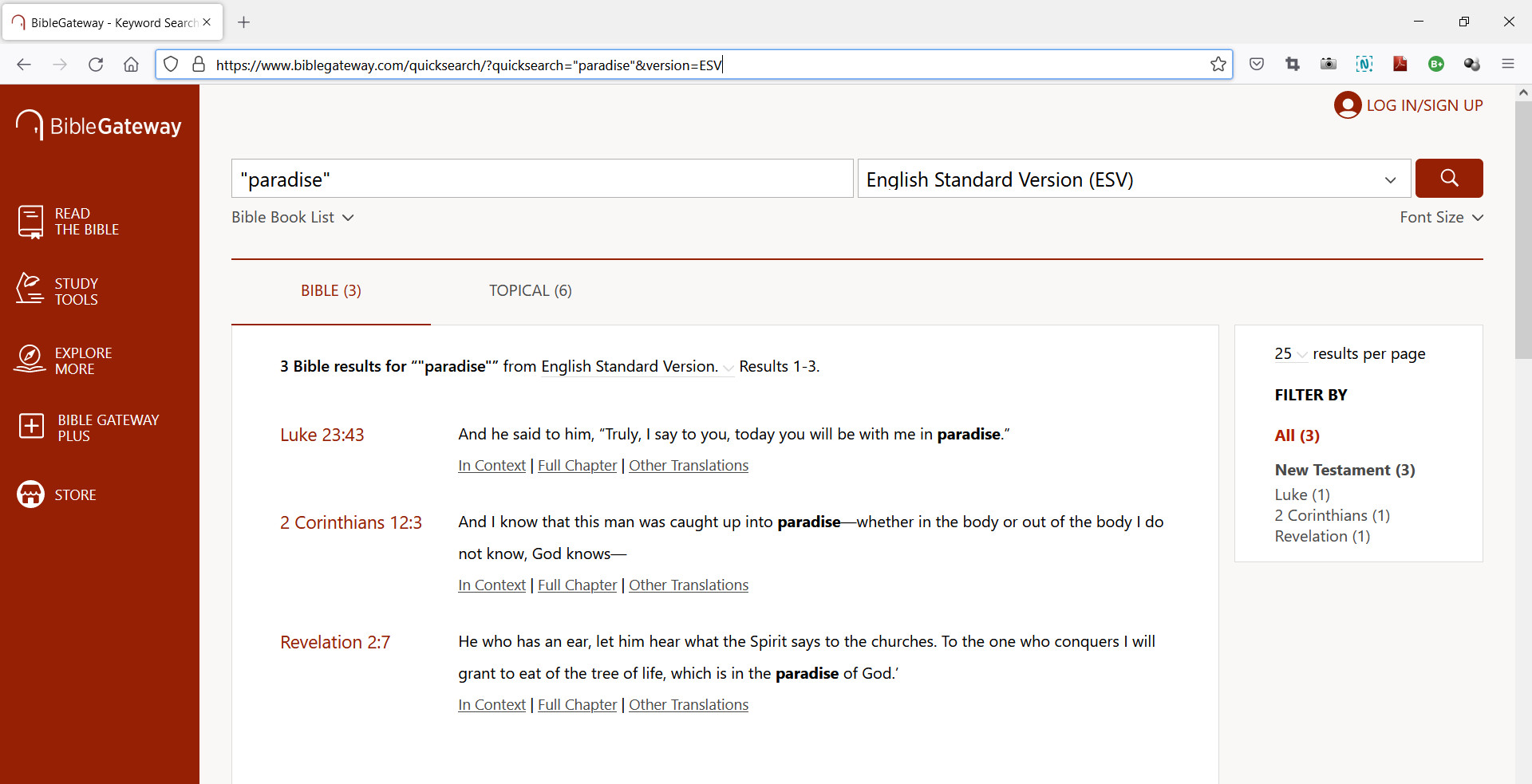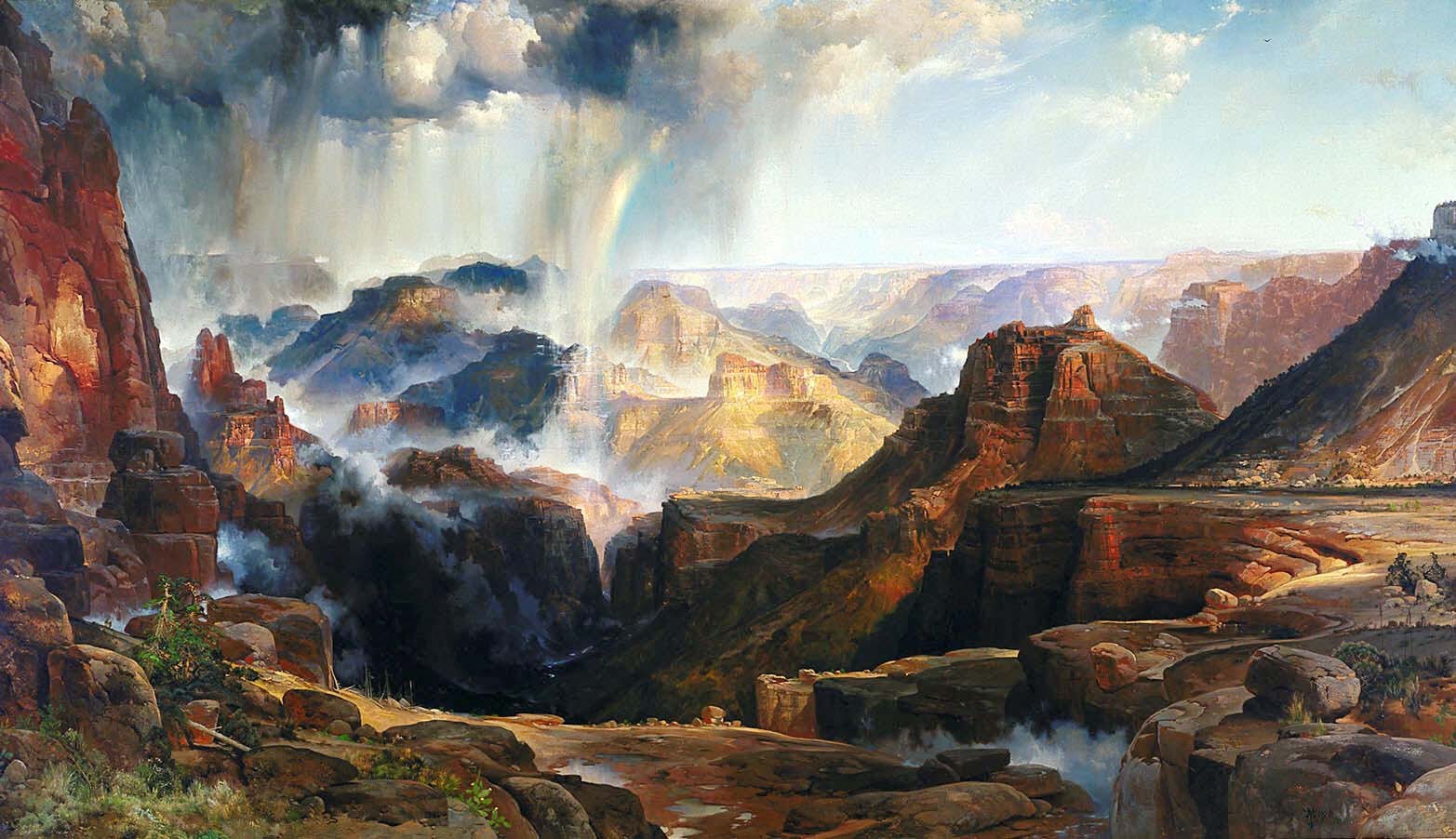Paradise
From Sheol to Heaven
The word "paradise" is used in total 3 times in the Scriptures (ESV), all of them in the New Testament. What is paradise?
The comma in Luke 23:43
Luke 23:43 (TS2009)
And YHWSO said to him, “Truly, I say to you today, you shall be with Me in paradise.”
Luke 23:43 (ESV)
And he said to him, “Truly, I say to you, today you will be with me in paradise.”
In the Hebrew and Greek Scriptures there are no commas, these commas have been added by translators depending on the context or interpretation of the Scriptures. Luke 23:43 has a comma which, depending of its place in the sentence, can change the meaning of what the Messiah said. People often allude to ancient Greek and complex explanations involving the Greek language. But does the Word of God really need all these extra-biblical explanations to make sense? The phraseI say to you today(with or without comma) appears in total only 1 time in the Scriptures (ESV). The phraseI say to youappears in total around 96 times in the Scriptures (ESV). The typical phraseTruly I say to you(with or without comma) appears in total around 72 times in the Scriptures (ESV) of which all appear in the Gospels and all were typically said by the Messiah. So the Messiah never used a word like "today" anywhere else in Scriptures in combination with the phrase "(Truly) I say to you". The word "Truly" is interesting because with that word the Messiah tells His listeners to pay close attention to what He is about to say. Obviously, the word "today" doesn't add any meaning to "I say to you". So would the Messiah use an additional (meaningless) word like "today" in this particular case while we know that nowhere else He did? The Messiah knew that He and the man next to Him would die that same day. Therefore it is more likely that the word "today" belongs after the comma.
Sheol
Luke 23:46 (TS2009)
And crying out with a loud voice, YHWSO said, “Father, into Your hands I commit My spirit.” And having said this, He breathed His last.
After death all people, good and bad, go to a place awaiting judgment in the time of the end. That place is called Sheol in the OT or Hades in the NT. Some people say that it wouldn't be possible to be in paradise on the same day the Messiah died because He would be three days in the grave between His death and resurrection. But only His mortal human body was in the earthly grave. What about His spirit? Just before He breathed His last breath the Messiah said:Father, into your hands I commit my spirit!(Luke 23:46). The Messiah explained Sheol with the parable of the rich man and the poor beggar...
Luke 16:22-26 (TS2009)
And it came to be that the beggar died, and was carried by the messengers to the bosom of Abraham. And the rich man also died and was buried. And while suffering tortures in She’ol, having lifted up his eyes, he saw Abraham far away, and El‛azar in his bosom. And crying out he said, ‘Father Abraham, have compassion on me, and send El‛azar to dip the tip of his finger in water and cool my tongue, for I am suffering in this flame.’ But Abraham said, ‘Son, remember that in your life you received your good, and likewise El‛azar the evil, but now he is comforted and you are suffering. And besides all this, between us and you a great chasm has been set, so that those who wish to pass from here to you are unable, nor do those from there pass to us.’
In Sheol there are at least two places, one is a place of rest reserved for God's people (also called the "bosom of Abraham") and the other is a place of torture reserved for all ungodly people. Also the Son of God went to Sheol after His death as was prophesied in the OT (Psalms 16:10, Psalms 30:3, Psalms 86:13). He went there for three days, while His human body was in the grave. The physical location of Sheol was explained by the Messiah when He said:For as Yonah was three days and three nights in the stomach of the great fish, so shall the Son of Adam be three days and three nights in the heart of the earth.(Matthew 12:40). Interestingly, His body was buried in a tomb on the surface of the earth, but the Son of God said He would go to the "heart of the earth". That likely means that His spirit went to the heart of the earth for three days between His death and resurrection.
Luke 20:37-38 (TS2009)
But that the dead are raised, even Mosheh showed at the bush when he called YHWH ‘the Elohim of Abraham, and the Elohim of Yitshaq, and the Elohim of Ya‛aqob.’ “Now He is not the Elohim of the dead, but of the living, for all live to Him.”
After death all people's spirits, including those of God's people (like Abraham, Isaac and Jacob) went to Sheol to await resurrection and judgment. In Sheol there were at least two places, separated by a chasm, one for God's people and one for the ungodly people.
Paradise
The word "paradise" appears only 3 times in the Scriptures (ESV). So what does it mean to be in paradise?
2 Corinthians 12:2-4 (TS2009)
I know a man in Messiah who fourteen years ago – whether in the body I do not know, or whether out of the body I do not know, Elohim knows – such a one was caught up to the third heaven. And I know such a man – whether in the body or out of the body I do not know, Elohim knows – that he was caught up into paradise and heard unspeakable words, which it is not right for a man to speak.
According to Paul people who are "in Messiah" are caught up into into paradise or into the "third heaven". There are several heavens above the earth (1 Kings 8:23) and there is a heaven of heavens (2 Chronicles 2:6, Nehemiah 9:6) and (from the heaven of heavens) God looks down on the heavens (Psalms 113:4-6).
Revelation 2:7 (TS2009)
He who has an ear, let him hear what the Spirit says to the assemblies. To him who overcomes I shall give to eat from the tree of life, which is in the midst of the paradise of Elohim.” ’
People who will "overcome" will go to the paradise of God in heaven. In Revelation we read thatHe who overcomes shall by no means be harmed by the second death.(Revelation 2:11). Paul said thatFor the wages of sin is death, but the favourable gift of Elohim is everlasting life in Messiah YHWSO our Master.(Romans 6:23) andTherefore, if anyone is in Messiah, he is a renewed creature – the old matters have passed away, see, all matters have become renewed!(2 Corinthians 5:17). Therefore it seems logical to believe that the place to await resurrection and judgment for God's people changed from Sheol, or the "heart of the earth", to a place in heaven which is also called paradise. The Messiah further explained to His disciples shortly before His death...
John 14:1-3 (TS2009)
Let not your heart be troubled. Believe in Elohim, believe also in Me. “In My Father’s house are many staying places. And if not, I would have told you. I go to prepare a place for you. And if I go and prepare a place for you, I shall come again and receive you to Myself, that where I am, you might be too.
It seems to me that, after His death, the Son of God went to God's people awaiting resurrection and judgment in the "old" paradise in Sheol. The man hanging next to the Messiah repented and truly believed in Him. The Messiah knew that they would die that same day and the man next to Him was regarded one of God's people because of his faith. Whereas before the ascendance into heaven of the Messiah all God's people went to paradise in Sheol after death, since the ascendance of the Messiah God's people go to paradise in heaven. The Messiah saidAnd I, if I am lifted up from the earth, shall draw all men unto Myself.(John 12:32). Paul saidFor unto this Messiah died and rose and lived again, to rule over both the dead and the living.(Romans 14:9). Peter further explained...
Acts 2:24-32 (TS2009)
Him Elohim raised up, having loosed the pangs of death, because it was impossible that He could be held in its grip. For Dawid says concerning Him, ‘I saw YHWH before me continually, because He is at my right hand, in order that I should not be shaken. ‘For this reason my heart rejoiced, and my tongue was glad, and now my flesh shall also rest in expectation, because You shall not leave my being in She’ol, nor shall You give Your Lovingly-committed One to see corruption. ‘You have made known to me the ways of life, You shall fill me with joy in Your presence.’ Men and brothers, let me speak boldly to you of the ancestor Dawid, that he died and was buried, and his tomb is with us to this day. Being a prophet, then, and knowing that Elohim had sworn with an oath to him: of the fruit of his loins, according to the flesh, to raise up the Messiah to sit on his throne, foreseeing this he spoke concerning the resurrection of the Messiah, that His being was neither left in She’ol, nor did His flesh see corruption. Elohim has raised up this YHWSO, of which we are all witnesses.
By His death the Son of God conquered death. His temporary dead human body went to the grave. His spirit went to paradise in Sheol for three days. Then He was resurrected on earth to appear before His disciples. And only then was He taken up into heaven to God.


